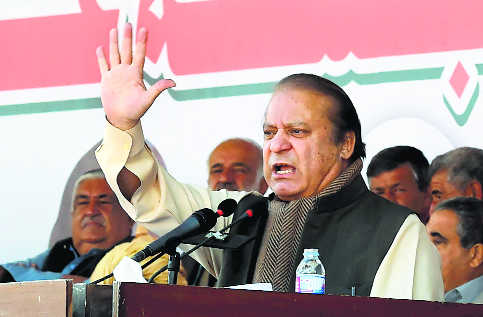
Nawaz Sharif
RK Kaushik
Secretary, Government of Punjab
Nawaz Sharif, former Prime Minister of Pakistan, recently said that the Establishment (army and ISI) removed him from prime-ministership through judicial dexterity because he had not obsequiously followed their orders regarding the trial of General Pervez Musharraf. He has been using the terms like 'Umpire' and Khalai Makhlook (Aliens) for the Establishment. Nawaz has been facing problems since the leakage of Panama papers in April, 2016; he has been badgered by the army and ISI (Inter Services Intelligence). He had to also face the Supreme Court and Joint Investigation Team (JIT) which ultimately found him guilty. The Supreme Court, on July 28, 2017 declared him to be neither sadiq (truthful) nor amin (honest). His trial continues in a special court in Islamabad and the judgment is likely to be announced soon. It is clear that the judgment would send him to prison. He stands debarred from contesting an election and to head a political party. It seems that his political career is over.
The Establishment in Pakistan has been in existence virtually ever since its inception as a nation. It has total monopoly and control over defence and foreign policy, including important policies like nuclear policy, US policy, China policy, India policy, Middle East policy, Afghanistan and Iran policy, defence budget etc. These have become 'no-go areas' for political leaders and civilian officers. Universally, the primary role of an army is to guard against external aggression and provide external security to a state and is a well-accepted institution all over the world with tasks assigned.
Pakistan could not have the vaulting quality of leadership after Muhammad Ali Jinnah (who died on September 11, 1948). In the early 1950s, social chaos in Pakistan did make the political organisations weak and corrupt and that promoted nepotism. The newly born 'Islamic state' passed through febrile situations, with landlords, corrupt politicians and bureaucrats holding powers and influence over the public offices and filling their coffers. Thus, mainstream political parties lost the people's trust. The circumstances created by the politicians enhanced military's power. Very often, elections were avoided by the state elite and when conducted, they led to political turmoil and political precariousness. The weakness of the political forces led to fragmentation and factionalism among civil society and political classes.
The tradition of the generals of Pakistan accusing and cornering their political leaders has continued from the first army ruler Field Marshal Ayub Khan to the present Army Chief, Gen Qamar Javed Bajwa. The Army has mastered the art of controlling various fields, including Press, TV, journalists, business, bureaucracy and even making and breaking parties and leaders. The Fouji Foundation, controlled by the Establishment, has assets of more than Rs 45,000 crore. Ayesha Siddiqa, a Pakistan Audit and Accounts Service Officer-turned-journalist estimates the Establishment's private wealth to be more than $ 20 billion at the 2015 price level. The coup d'eats which took place in Pakistan have been gleefully upheld by the superior courts by misinterpretation of law, nay constitution. It is a fact that the judiciary acts as per the desires of the Establishment and has very rarely confronted it except during the period of Chief Justice Iftikhar Chaudhry in 2007.
The Pakistan army pushed itself into direct control of governance through sidelining the weak political class when the first martial law was imposed in October 1958 and since then, it has strengthened its position to become a dominant player in power politics. Over the 71 years of the country's history, the army, nay Establishment, has experienced direct power four times, and has even learnt to negotiate and exercise authority when not directly in control of the government. It is well known that it controls the bureaucracy and the police, which dare not disobey it.
Democracy in Pakistan has remained perennially feeble. Whenever any political leader — whether Zulfiqar Ali Bhutto, Benazir Bhutto or Nawaz Sharif — has tried to intrude into the 'no-go areas' or dared to confront the Establishment, then the Establishment showed its power and imperiousness and savagely stopped and contemptuously removed them from power and sometimes made horrible examples out of them with alacrity.
With Nawaz getting ostracised from politics and direct governance, the Establishment is likely to back cricketer-turned-politician Imran Khan to head a pusillanimous coalition government and may allow Punjab CM Shahbaz Sharif who heads the Pakistan Muslim League (N) to remain in opposition or may allow him even to control the province of Punjab in coalition with others. The sole purpose is to keep a Damocles' sword over Imran's head as it well understands the mindset and high ambitions of Imran and would like to keep him weak and under check, lest he dare to tread in the 'no-go areas'.
The future of Pakistan remains tied to the desires of the powerful Establishment, nay the Khalai Makhlook, which acts in mysterious ways for its existence and has become an umpire for politicians and bureaucrats as they play their games under its watchful eye and tight control. How much Nawaz can save himself, his family and his party will become clear in times to come because history, after all, is written by the victors.



























